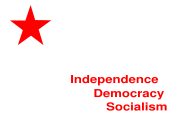INDO-US NUCLEAR DEAL: COMPROMISING OUR SOVEREIGNTY TO SERVE US INTERESTS
Friends,
The National Common Minimum Programme sets out the basic tenet of the foreign policy of the UPA Government in the following terms: “The UPA government will pursue an independent foreign policy keeping in mind its past traditions. This policy will seek to promote multipolarity in world relations and oppose all attempts at unilateralism.” There is no mention of any strategic relations or partnership with the US. However, the UPA Government has tried, since its inception, to circumvent and breach this important provision of the NCMP and continue with the NDA Government’s policy of deepening India’s strategic ties with the US and become its subordinate ally. However, within a month all these formulations were forgotten and series of strategic tie up with the US was achieved:
INDO-US NUCLEAR DEAL AND INDIA'S STRATEGIC TIES WITH THE US:
● On June 28, 2005, just prior to Bush-Manmohan Agreement of July 18, 2005, New Framework for India-US Defence Relationship was signed. In this Agreement, it is stated, U.S.-India defence relationship derives from a common belief in freedom, democracy, and the rule of law, and seeks to advance shared security interests. Considering that the Iraq invasion was justified by the US as bringing democracy to West Asia, a reference to a shared belief in democracy and rule of law cannot be acceptable to the Indian people.
● The Bush-Manmohan agreement was followed immediately by India’s vote against Iran in the International Atomic Energy Authority (IAEA). Senator Lugar in his opening remarks in the Senate Foreign Relations Committee had noted, approvingly, “We have already seen strategic benefits from our improving relationship with India. India’s votes at the IAEA on the Iran issue last September and this past February demonstrate that New Delhi is able and willing to adjust its traditional foreign policies and play a constructive role on international issues.” Manmohan Singh’s oft-repeated claims that India’s foreign policy would not change due to this Deal, is not borne out by his Governments’ record, especially when the US officials are busy selling the agreement to the US Congress on the strategic value of India aligning with the US.
● Currently, the Manmohan Singh Government is negotiating a Logistics and Service Agreement. This would virtually reduce India to an American ally in Asia. It essentially allows refueling and complete access to Indian facilities for all US ships and aircraft. The US navy can bomb Iraq and Iran and then come to India’s ports for rest, recreation and refueling, before going back for another round of hostilities. Step by step, from a vote against Iran, we are now to become hosts to the US navy in its military misadventures in West Asia and elsewhere. More importantly, as far as the 123 agreement is concerned, the Hyde Act categorically demands India to fall in line with US as explained below:
HYDE ACT AND INDIA'S INDEPENDENT FOREIGN POLICY:
The Hyde Act is an enabling legislation that allows the US Congress to consider an agreement for civilian nuclear co-operation under the section 123 of the US Atomic Energy Act. The Hyde Act said very clearly that India’s foreign policy needed to be congruent to the US; it had to work in tandem with the US on isolating Iran. It demanded that India join the illegal PSI regime. It also restricted India’s access to technology to fuel and import of reactors. It denied access to technology for the fuel cycle – enrichment or reprocessing – and also for heavy water. It also made clear that in the event the Deal was canceled, the fuel supplies from the US would not only stop but the US would work with other suppliers to stop their supplies to India too. This is a major issue as earlier also, the US had stopped supplies to Tarapur reactors. If we put in a substantial nuclear program using imported reactors, this would mean our power program could be held hostage to the US’s continued goodwill.
All these tie ups with the US and the Hyde Act provision of the 123 agreement, seriously compromises our sovereignty and independent foreign policy. Should we allow our sovereignty be compromised by acting as junior partners of the greatest war machine and imperialist power that the world has ever seen? It is in this context that the Indo-US nuclear deal is not a narrow issue of the Left. It is about struggling to ensure that the sovereignty of our country is protected.
Today, it is the Left forces, who are spearheading the struggle against US domination of our country and the tendency within ruling classes to act as junior partners of imperialism. It is shameful that when the Left is engaged in a heated struggle against US imperialism, the 'infantile' ultras of AISA in the most sectarian manner is attacking the Left, only strengthening the hands of the right wing slander. Their political bankruptcy gets reflected by the fact that instead of mobilizing opinion against the deal, they are more interested in parroting the slanders of the media against the Left. This is a manifestation of their frustration, since the CPI(M-L) is irrelevant as far as the future of this deal is concerned. With regard to their point about voting out this government, let us remind our friends in AISA that the RSS Chief KS Sudarsan has said the same thing in a latest editorial in Organizer. So it is quite obvious whose politics they are serving by taking this position. We appeal to the student community to stand united against the Indo-US nuclear deal and in defence of our sovereignty and rally behind the Left.
Sd/- Rajiv Kumar Ranjan, Secretary, SFI-JNU; Sd/- Roshan, President, SFI-JNU





No comments:
Post a Comment